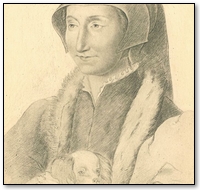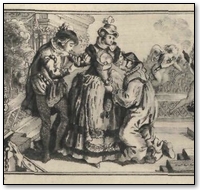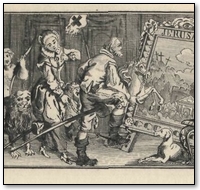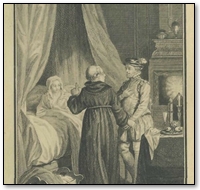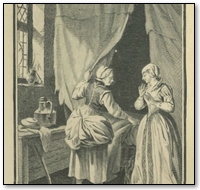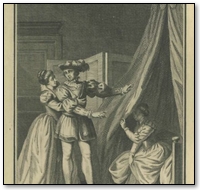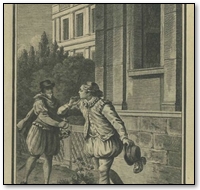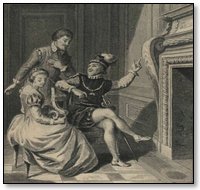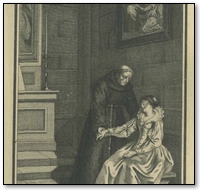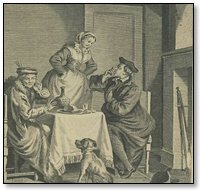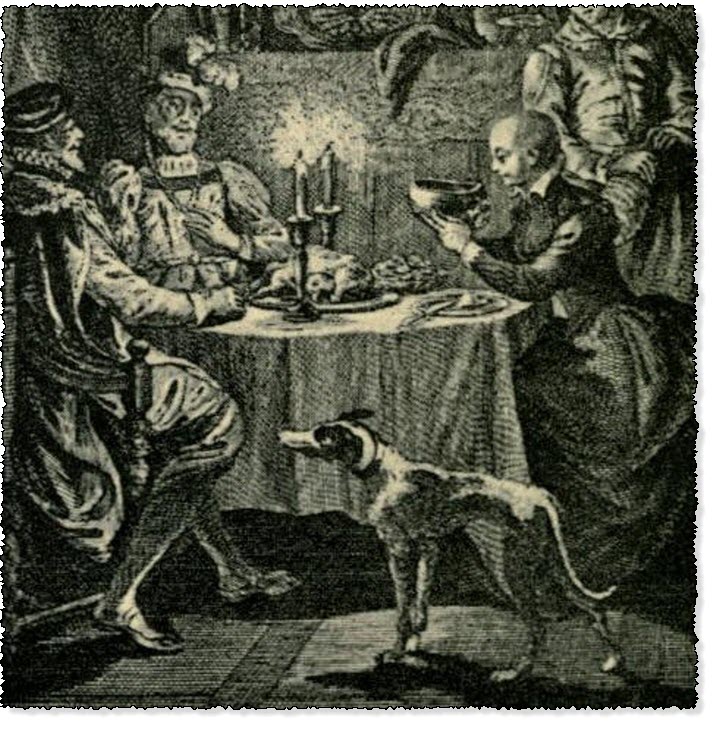
Bernage Observing the German Lady's Strange Penance
The Heptameron - Day 4, Tale 32 - Bernage Observing the German Lady's Strange Penance
TALE XXXII.
Bernage, learning in what patience and humility a German lady submitted to the strange penance laid upon her for her unchastity by her husband, so persuaded the latter that he forgot the past, showed pity to his wife, and, taking her back again, afterwards had by her some very handsome children.
King Charles, eighth of the name, sent into Germany a gentleman called Bernage, Lord of Sivray, near Amboise, (1) who to make good speed spared not to travel both by day and night. In this wise he came very late one evening to a gentleman's castle, where he asked for lodging, a request which was not granted him without great difficulty.
1 Bernage, Bernaige, or Vernaiges, as the name is diversely written in the MSS. of the Heptameron, was in 1495 equerry to Charles VIII., a post which brought him an annual salary of 300 livres.—See Godefroy's Histoire de Charles VIII., p. 705. Civray, near Chenonceaux, on the Cher, was a fief of the barony of Amboise. In 1483 we find a certain John Goussart doing homage for it to the crown.—Archives Nationales, Section Domaniale, côte 3801.—L.
However, when the gentleman came to know that he was servant to so great a King, he went to him and begged him not to take the churlishness of his servants in bad part, since he was obliged to keep his house thus closed on account of certain of his wife's kinsfolk who sought to do him hurt. Bernage then told him the nature of his mission, wherein the gentleman offered to serve the interests of the King his master, so far as in him lay; and he forthwith led Bernage into the house, where he lodged and entertained him honourably.
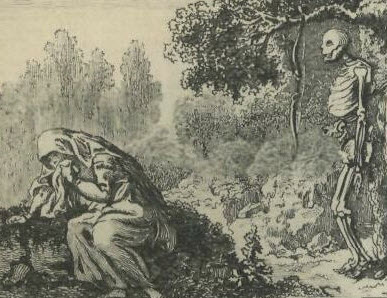
It was the hour for supper, and the gentleman led him into a handsome room, hung with beautiful tapestry, where, as soon as the meats were served, he saw come from behind the hangings the most beautiful woman it were possible to behold; though her head was shorn and she was dressed in black garments of the German fashion.
After the gentleman had washed his hands with Bernage, water was borne to the lady, who also washed hers and then sat down at the end of the table without speaking to the gentleman, or he to her. The Lord de Bernage looked very closely at her, and thought her one of the most beautiful women he had ever seen, except that her face was very pale, and its expression very sad.
After eating a little, she asked for drink, which was brought to her by a servant in a most marvellous vessel, for it was a death's head, the eyeholes of which were closed with silver; and from this she drank two or three times. When she had supped, the lady washed her hands, made a reverence to the lord of the house, and retired again behind the tapestry without speaking to any one. Bernage was exceedingly amazed at this strange sight, and became very melancholy and thoughtful.
The gentleman, who perceived this, then said to him—
"I perceive that you are astonished at what you have seen at this table; but for the sake of the excellence that I find in you I will explain the matter, so that you may not think I could show such cruelty without reasons of great weight. The lady whom you saw is my wife; I loved her more than ever man loved woman, insomuch that in order to marry her I forgot all fear, and brought her hither in defiance of her relations. On her part, she showed me so many tokens of love that I would have risked ten thousand lives in bringing her hither, to her delight and mine. And here we lived for a while in such peace and gladness that I deemed myself the happiest gentleman in Christendom.
"But it came to pass, upon my undertaking a journey which my honour compelled me to make, she forgot her honour, conscience and love for me to such a degree as to fall in love with a young gentleman whom I had brought up in this house, and this I thought I could perceive when I returned home again. Nevertheless, the love I bore her was so great that I was not able to mistrust her, until at last experience opened my eyes and made me see what I dreaded more than death, whereupon my love for her was turned to frenzy and despair in such wise that I watched her closely, and one day, while feigning to walk abroad, I hid myself in the room in which she now dwells.
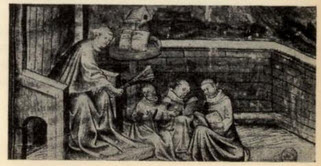
Heptameron Story 32
"Thither she withdrew soon after my departure, and sent for the young gentleman, whom I saw come in with such familiarity as should have been mine alone. But when I saw him about to get upon the bed beside her, I sprang out, seized him in her very arms, and slew him. And as my wife's crime seemed to me so great that death would not suffice to punish it, I laid upon her a penalty which she must hold, I think, to be more bitter than death; and this penalty was to shut her up in the room to which she was wont to retire to take her greatest pleasures in the company of him for whom she had more love than she had for me; and there I further placed in a cupboard all her lover's bones, hanging there even as precious things are hung up in a cabinet.
"That she may not lose the memory of this villain I cause her to be served with his skull, (2) in place of a cup, when she is eating and drinking at table, and this always in my presence, so that she may behold, alive, him whom her guilt has made her mortal enemy, and dead, through love of her, him whose love she did prefer to mine. And in this wise, at dinner and at supper, she sees the two things that must be most displeasing to her, to wit, her living enemy, and her dead lover; and all this through her own great sinfulness.
2 It will be remembered that the Lombard King Alboin forced his wife Rosamond to drink his health out of a goblet which had been made from the skull of her father Cunimond, sovereign of the Gepidæ. To revenge herself for this affront, Rosamond caused her husband to be murdered one night during his sleep in his palace at Pavia.—Ed.
"In other matters I treat her as I do myself, save that she goes shorn; for an array of hair beseems not the adulterous, nor a veil the unchaste.
"For this reason is her hair cut, showing that she has lost the honour of virginity and purity. Should it please you to take the trouble to see her, I will lead you to her."
To this Bernage willingly consented, and going-downstairs they found her in a very handsome apartment, seated all alone in front of the fire. The gentleman drew aside a curtain that hung in front of a large cupboard, wherein could be seen hanging a dead man's bones. Bernage greatly longed to speak to the lady, but durst not do so for fear of the husband. The gentleman, perceiving this, thereupon said to him—
"If it be your pleasure to say anything to her, you will see what manner of grace and speech is hers."
Then said Bernage to her—"Lady, your patience is as great as your torment. I hold you to be the most unhappy woman alive."
With tears in her eyes, and with the humblest grace imaginable, the lady answered—
"Sir, I acknowledge my offence to have been so great that all the woes that the lord of this house (for I am not worthy to call him husband) may be pleased to lay upon me are nothing in comparison with the grief I feel at having offended him."
So saying, she began to weep bitterly. The gentleman took Bernage by the arm and led him away.
On the following morning Bernage took his leave, in order to proceed on the mission that the King had given him. However, in bidding the gentleman farewell, he could not refrain from saying to him—
"Sir, the love I bear you, and the honour and friendship that you have shown me in your house, constrain me to tell you that, having regard to the deep penitence of your unhappy wife, you should, in my opinion, take compassion upon her. You are, moreover, young and have no children, and it would be a great pity that so fair a lineage should come to an end, and that those who, perhaps, have no love for you, should become your heirs."
The gentleman, who had resolved that he would never more speak to his wife, pondered a long time on the discourse held to him by the Lord de Bernage, and at last recognised that he had spoken truly, and promised him that, if his wife should continue in her present humility, he would at some time have pity upon her.
Accordingly Bernage departed on his mission, and when he had returned to his master, the King, he told him the whole story, which the Prince, upon inquiry, found to be true. And as Bernage among other things had made mention of the lady's beauty, the King sent his painter, who was called John of Paris, (3) that he might make and bring him a living portrait of her, which, with her husband's consent, he did. And when she had long done penance, the gentleman, in his desire to have offspring, and in the pity that he felt for his wife who had submitted to this penance with so much humility, took her back again and afterwards had by her many handsome children. (4)
3 John Perréal, called "Jehan de Paris," was one of the most famous painters of the reigns of Charles VIII. and Louis XII. At the end of 1496 we find him resident at Lyons, and there enjoying considerable celebrity. From October 1498 to November 1499 he figures in the roll of officers of the royal household, as valet of the wardrobe, with a salary of 240 livres. In the royal stable accounts for 1508 he appears as receiving ten livres to defray the expense of keeping a horse during June and July that year. He is known to have painted the portrait and planned the obsequies of Philibert of Savoy in 1509; to have been sent to England in 1514 to paint a portrait of the Princess Mary, sister of Henry VIII., who married Louis XII.; and in 1515 to have had charge of all the decorative work connected with Louis XII.'s obsequies. In his Légende des Vénitiens (1509) John Le Maire de Belges praises Perréal's skill both in landscape and portrait painting, and describes him as a most painstaking and hardworking artist. He had previously referred to him in his Temple d'Honneur et de Vertu (1504) as being already at that period painter to the King. In the roll of the officers of Francis I.'s household (1522) Perréal's name takes precedence of that of the better known Jehannet Clouet, but it does not appear in that of 1529, about which time he would appear to have died. Shortly before that date he had designed some curious initial letters for the famous Parisian printer and bookseller, Tory. The Claud Perréal, "Lyonnese," whom Clement Marot commemorates in his 36th Rondeau would appear to have been a relative, possibly the son, of "Jehan de Paris."—See Léon de La Borde's Renaissance des Arts, vol. i., Pericaud ainé's Notice sur Jean de Paris, Lyons, 1858, and more particularly E. M. Bancel's Jehan Perréal dit Jean de Paris, peintre et valet-de-chambre des rois Charles VIII. Louis XII., &c. Paris, Launette, 1884.—L. and M. 4 Brantôme refers to this tale, as an example of marital cruelty, in his Vies des Dames Galantes, Lalanne's edition, vol. ix. p. 38.—L.
"If, ladies, all those whom a like adventure has befallen, were to drink out of similar vessels, I greatly fear that many a gilt cup would be turned into a death's head. May God keep us from such a fortune, for if His goodness do not restrain us, there is none among us but might do even worse; but if we trust in Him He will protect those who confess that they are not able to protect themselves. Those who confide in their own strength are in great danger of being tempted so far as to be constrained to acknowledge their frailty. Many have stumbled through pride in this way, while those who were reputed less discreet have been saved with honour. The old proverb says truly, 'Whatsoever God keeps is well kept.'"
"The punishment," said Parlamente, "was in my opinion a most reasonable one, for, just as the offence was more than death, so ought the punishment to have been."
"I am not of your opinion," said Ennasuite. "I would rather see the bones of all my lovers hanging up in my cabinet than die on their account. There is no misdeed that cannot be repaired during life, but after death there is no reparation possible."
"How can shame be repaired?" said Longarine. "You know that, whatever a woman may do after a misdeed of that kind, she cannot repair her honour."
"I pray you," said Ennasuite, "tell me whether the Magdalen has not now more honour among men than her sister who continued a virgin?" (5)
5 Martha, sister of Lazarus and Mary Magdalen.—M.
"I acknowledge," said Longarine, "that we praise her for the great love she bore to Jesus Christ and for her deep repentance; yet the name of sinner clings to her."
"I do not care what name men may give me," said Ennasuite, "if only God forgive me, and my husband do the same. There is nothing for which I should be willing to die."
"If the lady loved her husband as she ought," said Dagoucin, "I am amazed that she did not die of sorrow on looking at the bones of the man whom her guilt had slain."
"Why, Dagoucin," returned Simontault, "have you still to learn that women know neither love nor even grief?"
"Yes, I have still to learn it," said Dagoucin, "for I have never made trial of their love, through fear of finding it less than I desired."
"Then you live on faith and hope," said Nomerfide, "as the plover does on air. (6) You are easily fed."
6 This popular error was still so prevalent in France in the last century, that Buffon, in his Natural History, took the trouble to refute it at length.—B. J.
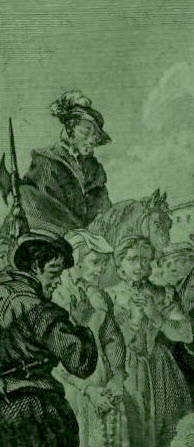
"Keep clear of the plague," said Geburon; "as for the other sickness you mention, I will warrant you against it. But I should like to know to whom the Lady Oisille will give her vote?"
"I give it," she said, "to Simontault, who I know will be sparing of none."
"That," he replied, "is as much as to say that I am somewhat given to slander; however, I will show you that reputed slanderers have spoken the truth. I am sure, ladies, that you are not so foolish as to believe all the tales that you are told, no matter what show of sanctity they may possess, if the proof of them be not clear beyond doubt. Many an abuse lurks even under the guise of a miracle, and for this reason I am minded to tell you the story of a miracle that will prove no less to the honour of a pious Prince than to the shame of a wicked minister of the Church."
Online Edition of the Heptameron
This is the Heptameron of Marguerite de Navarre
Other Sites: CruikshankArt.com · Dante's Inferno · Book-Lover.com · Canterbury Tales ·
This site is created by the Heptameron Information Society.

